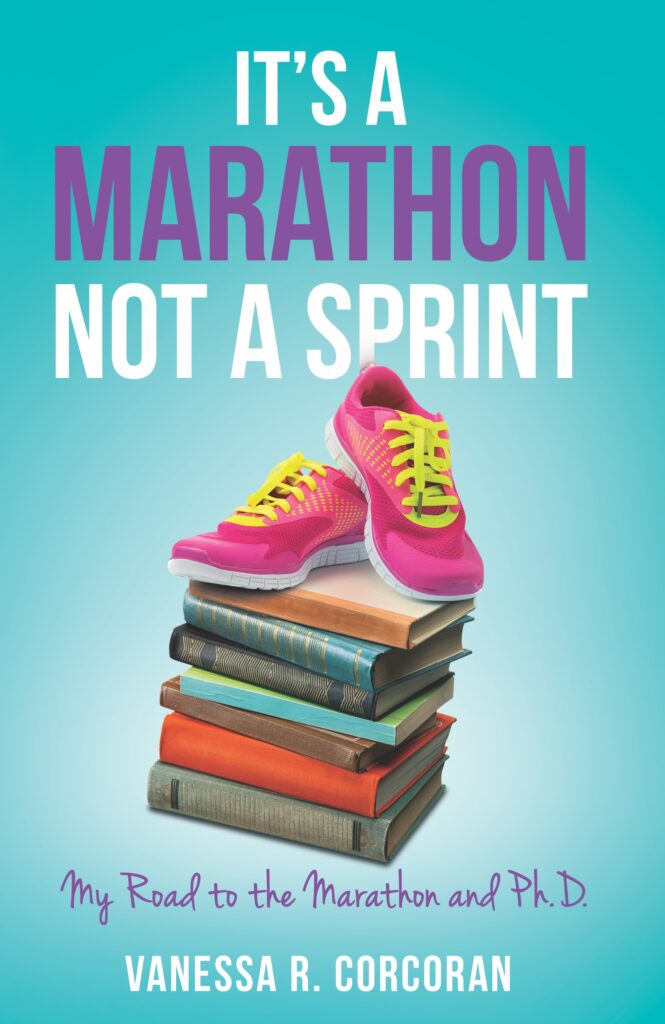What Do Running a Marathon and Researching a Ph.D. Have in Common? A New Memoir Explores the Connection
Vanessa Corcoran, an advising dean in Georgetown College and a professor in the Department of History, is celebrating International Women’s Day with the publication of her debut book, It’s a Marathon, Not a Sprint: My Road to the Marathon and Ph.D.
In Corcoran’s memoir, she explores the connection between the physical and the mental, examining her personal journey as a long-distance runner and academic.
A Catalyst for a Career
The Virgin Mary, as a saint and an icon, acted as a catalyst both for Corcoran’s academic career and her personal journey. Corcoran’s fascination with Mary led her to Washington, D.C., where she began a master’s program in history at The Catholic University of America. Her Ph.D. dissertation, also completed at Catholic University, analyzed representations of Mary in the late Middle Ages, highlighting the ways in which the ensuing years softened Mary’s persona and power.
“The quiet, obedient and maternal version of Mary is one with which many Catholics are familiar,” says Corcoran. “But in the Middle Ages there was a different representation of her as an incredibly powerful intercessor who saved people from disease, overturned ships in the middle of war and sparred, both verbally and physically, with the devil. My work seeks to reconcile how that Mary fits within a culture that often silences women’s voices.”

The cover of Corcoran’s new book.
Alongside her academic endeavors, Corcoran took up running, at first jogging just a few miles. Later Corcoran expanded her commitment and found a community of runners. The act of running strengthened Corcoran physically while simultaneously alleviating academic pressures.
“You get very confident when you’re running because you feel like you can do anything,” Corcoran says. “I ran my first marathon my first year of graduate school and I was instantly hooked. It was a life-changing experience, not just physically, but putting the time in on something difficult and achieving it.”
Corcoran recalls that the time away from her books allowed her to process and synthesize her research, rehearsing the oral defense of her dissertation, making mental tweaks to her argument and even pausing her run to pull out her phone and jot down new ideas.
It’s a Marathon Not a Sprint expands upon the various roles that she has taken on since completing her Ph.D. in 2017: medieval historian, professor, advisor, distance runner, wife, mother and author.
“I’ve found in my advising that it helps to share with students about your failures and struggles so they learn that other people have gone through these obstacles as well and there is a path forward,” reflects Corcoran.
She also shared that the mental struggles of being a graduate student were very real: Corcoran often observed others in the classroom who seemed more confident or assured of themselves. If she had only shared what she was feeling with her dissertation advisor, Corcoran notes, they would have openly supported and assisted her through the insecurities she was facing.
Inspiring and Encouraging Women
The drive to honor women and the strength which Corcoran has drawn from other women’s stories is what drove her to publish her memoir on International Women’s Day. Through her research, she wanted to offer her voice and perspective to others.
“I wanted to let my voice be heard when a lot of graduate students complete their program in silence,” reflects Corcoran. “This is the story, not only of my voice, but of the women who influenced mine.”
Her advice to graduate students right now: keep showing up. It may be “hard to see on any particular day how your work is going to pay off in the long run, but it’s the cumulative mileage of writing and reading” that is the ultimate prize. Show up to class, show up to workshops and create a community around you that’s supportive of what you’re doing both within your school life and home life.
-by Jessica Marr (G’19) and Hayden Frye (C’17)
